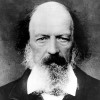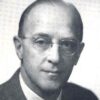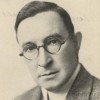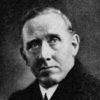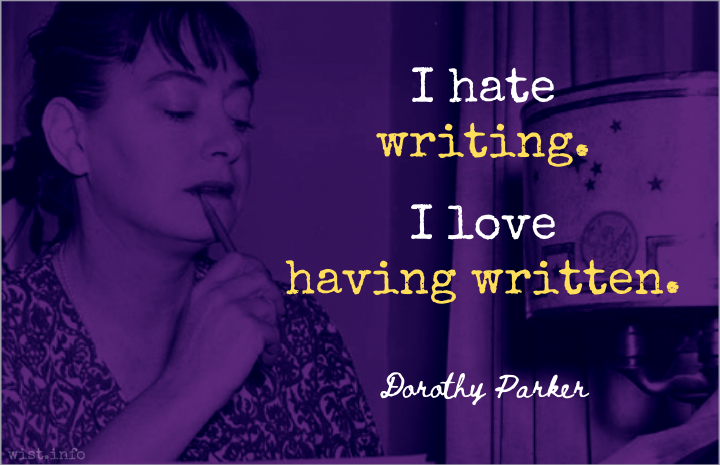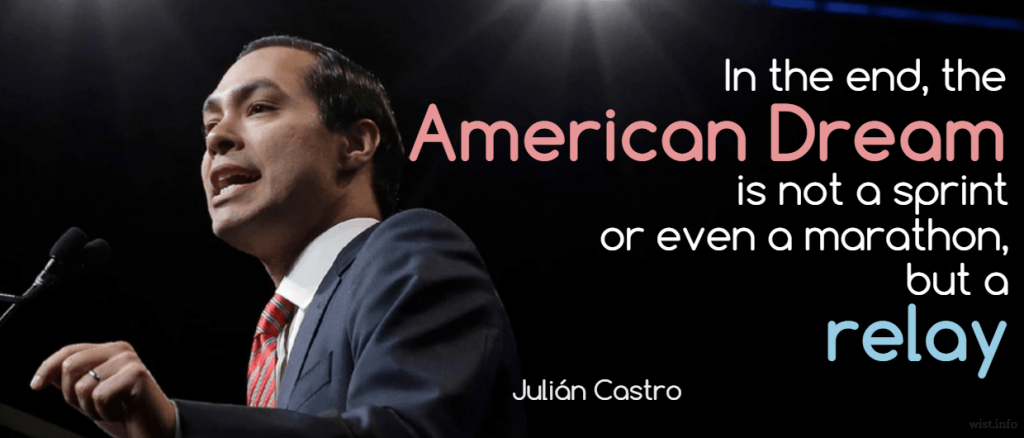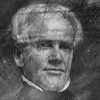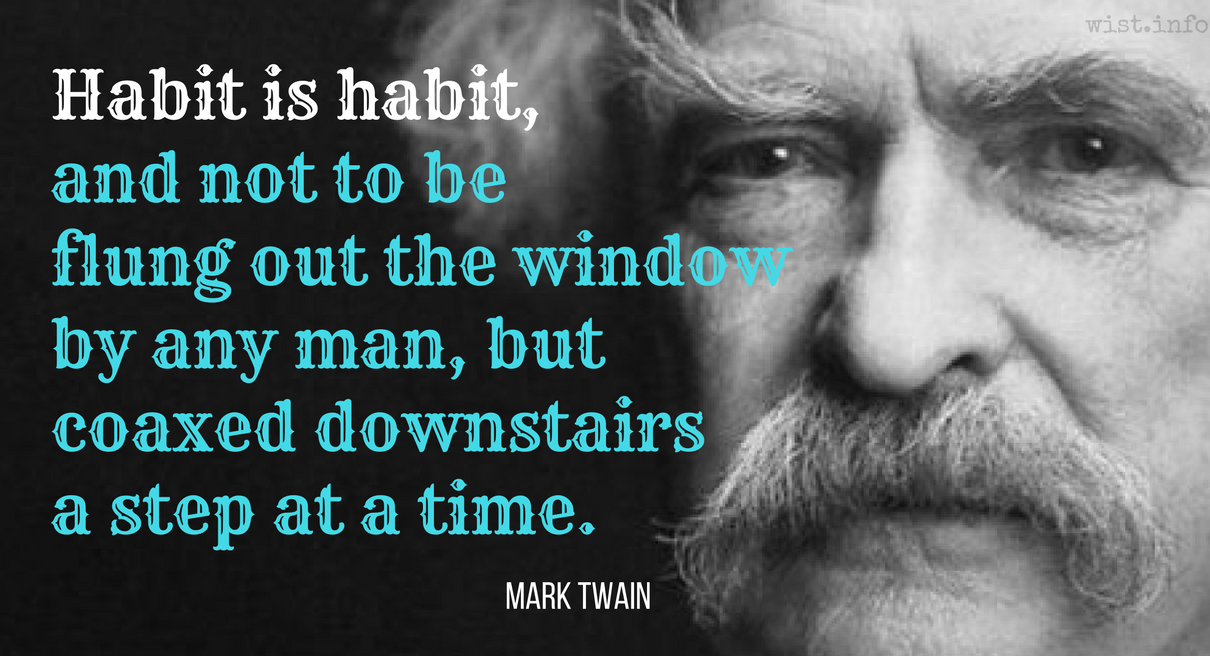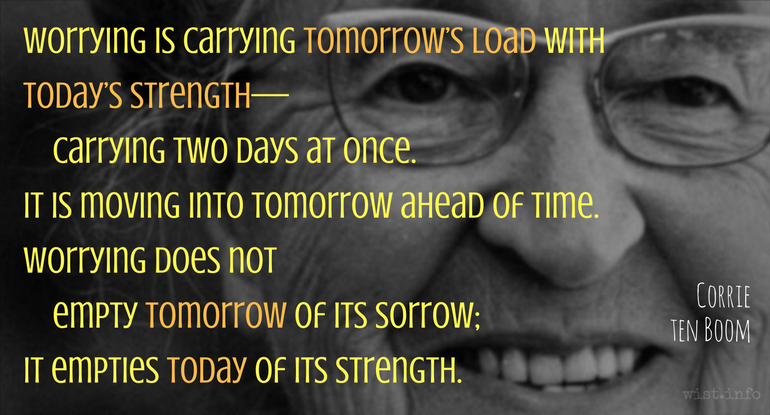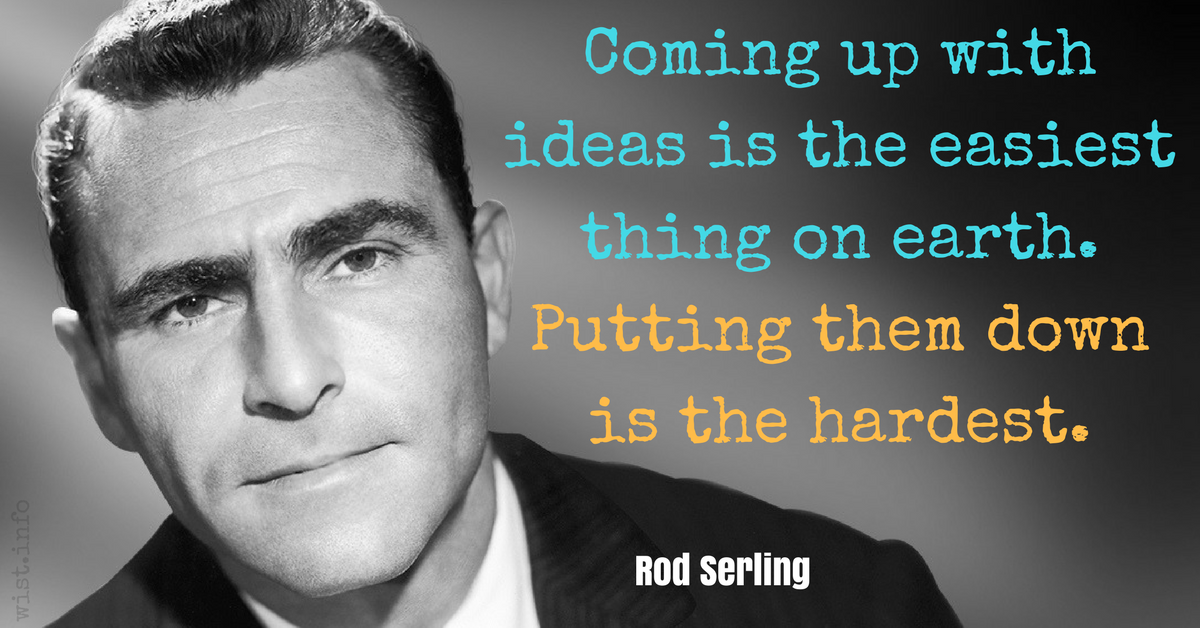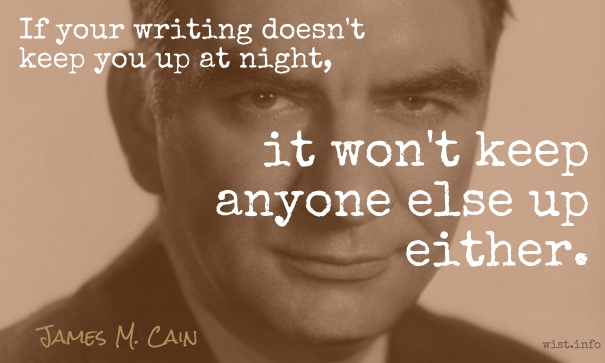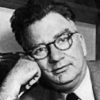You and I are old;
Old age hath yet his honour and his toil;
Death closes all: but something ere the end,
Some work of noble note, may yet be done,
Not unbecoming men that strove with Gods.
Quotations about:
effort
Note not all quotations have been tagged, so Search may find additional quotes on this topic.
When we look forward and try to project what may come out of a development, we are always wrong, because the by-products sometimes become far more important than the primary thing you started out to accomplish. Nevertheless, unintelligent motion is a great deal more important in research than intelligent standing still.
Charles F. Kettering (1876-1958) American inventor, engineer, researcher, businessman
“250 at Luncheon Honor Kettering,” New York Times (1936-11-11)
(Source)
Getting what you go after is success; but liking it while you are getting it is happiness.
Bertha Damon (1881-1975) American humorist, author, lecturer, editor [Bertha Clark Pope Damon]
A Sense of Humus, ch. 13 “Garden Sass” (1943)
(Source)
You can’t have a picnic lunch unless the party carrying the basket comes.
It [political opposition] is like dancing with a bear. When you’re dancing with a bear, you can’t get tired and sit down. You have to wait for the bear to get tired.
Joycelyn Elders (b. 1933) American pediatrician, public health administrator, academic
Keynote Speech, Sistersong Conference, Chicago (2007-06-03)
(Source)
All work is as seed sown; it grows and spreads, and sows itself anew.
Thomas Carlyle (1795-1881) Scottish essayist and historian
“Boswell’s Life of Johnson,” Critical and Miscellaneous Essays (1827-1855)
(Source)
Originally published in Fraser's Magazine, Vol 5, # 28 (1832). Reviewing a new 1831 edition of James Boswell, The Life of Samuel Johnson.
Why is it that we remember with effort but forget without effort? That we learn with effort but stay ignorant without effort? That we are active with effort, and lazy without effort?
[Quid est enim, quod cum labore meminimus, sine labore obliuiscimur; cum labore discimus, sine labore nescimus; cum labore strenui, sine labore inertes sumus?]Augustine of Hippo (354-430) Christian church father, philosopher, saint [b. Aurelius Augustinus]
City of God [De Civitate Dei], Book 22, ch. 22 (22.22) (AD 412-416) [tr. Green (Loeb) (1972)]
(Source)
(Source (Latin)). Alternate translations:
What is our labour to remember things, our labour to learn, and our ignorance without this labour? our agility got by toil, and our dullness if we neglect it?
[tr. Healey (1610)]
For why is it that we remember with difficulty, and without difficulty forget? learn with difficulty, and without difficulty remain ignorant? are diligent with difficulty, and without difficulty are indolent?
[tr. Dods (1871)]
How difficult it is to remember, how easy to forget; how hard to learn and how easy to be ignorant; how difficult to make an effort and how easy to be lazy.
[tr. Walsh/Honan (1954)]
How is it that what we learn with toil we forget with ease? that it is hard to learn, but easy to be in ignorance? That activity goes against the grain, while indolence is second nature?
[tr. Bettenson (1972)]
Why is it that we remember with such difficulty, but forget so easily? Why is it that we learn with such difficulty, yet so easily remain ignorant? Why is it that we are vigorous with such difficulty, yet so easily inert?
[tr. Dyson (1998)]
Fortune sumtimes shows us the way, but it iz energy that achieves sucksess.
[Fortune sometimes shows us the way, but it is energy that achieves success.]
Josh Billings (1818-1885) American humorist, aphorist [pseud. of Henry Wheeler Shaw]
Everybody’s Friend, Or; Josh Billing’s Encyclopedia and Proverbial Philosophy of Wit and Humor, ch. 131 “Affurisms: Plum Pits (1)” (1874)
(Source)
This process of the good life is not, I am convinced, a life for the faint-hearted. It involves the stretching and growing of becoming more and more of one’s potentialities. It involves the courage to be. It means launching oneself fully into the stream of life.
Genius begins great works; but labour alone finishes them.
[Le génie commence les beaux ouvrages, mais le travail seul les achève.]
Joseph Joubert (1754-1824) French moralist, philosopher, essayist, poet
Pensées [Thoughts], ch. 23 “Des Qualités de l’Écrivain et des Compositions Littéraires [On Writers and Literature]” ¶ 52 (1850 ed.) [tr. Lyttelton (1899), ch. 22, ¶ 19]
(Source)
(Source (French)). Alternate translations:
Genius begins beautiful works, but only labor finishes them.
[tr. Calvert (1866), ch. 8]
Genius begins great works; labour alone finishes them.
[tr. Attwell (1896), ¶ 335]
Beautiful works. Genius beings them, but labor alone finishes them.
[tr. Auster (1983)], 1801]
Character is what emerges from all the little things you were too busy to do yesterday, but did anyway.
Mignon McLaughlin (1913-1983) American journalist and author
The Second Neurotic’s Notebook, ch. 4 (1966)
(Source)
Your few quatrains are not amiss,
Your couplets too are neat; for this
You earn a mild regard,
But little fame, for many men
Can write good verses now and then —
To make a book is hard.[Quod non insulse scribis tetrasticha quaedam,
Disticha quod belle pauca, Sabelle, facis,
Laudo, nec admiror. Facile est epigrammata belle
Scribere, sed librum scribere difficile est.]Martial (AD c.39-c.103) Spanish Roman poet, satirist, epigrammatist [Marcus Valerius Martialis]
Epigrams [Epigrammata], Book 7, epigram 85 (7.85) (AD 92) [tr. Pott & Wright (1921)]
(Source)
"To Sabellus." (Source (Latin)). Alternate translations:
Cause thou dost pen Tetrasticks clean and sweet
And some few pretty disticks with smooth feet,
I praise but not admire:
Tis easy to acquire
Short modest Epigrams that pretty look,
But it is hard and tough to write a book.
[tr. Fletcher (1656)]
That some tetrasticks not amiss you write,
Or some few disticks prettyly indite,
I like, but not admire. With small paynes tooke
An epigram is writ; but not a booke.
[tr. Killigrew (1695)]
Some not absurd tetrastichs thou may'st squeeze;
And distichs, that can scarce deny to please.
I praise, yet not admire: a verse to cook
Is no hard task; but canst thou write a book?
[tr. Elphinston (1782), Book 3, ep. 54]
For sometimes writing quatrains which are not devoid of humour, Sabellus, and for composing a few distichs prettily, I commend you; but I am not astonished at you. It is easy to write a few epigrams prettily; but to write a book of them is difficult.
[tr. Bohn's Classical (1859)]
Your writing, not without wit, certain quatrains, your composing nicely a few distichs, Sabellus, I applaud, yet am not surprised. 'Tis easy to write epigrams nicely, but to write a book is hard.
[tr. Ker (1919)]
The fact that you can write with taste
A quatrain now and then
And even several couplets too
Is something I do commend,
But I'm not amazed, for after all
A few epigrams smart and neat
Are easy to write, but a bookful of them
Is quite another feat!
[tr. Marcellino (1968)]
That you write some quatrains not without wit and turn a few couplets prettily, Sabellus, is something I praise but do not wonder at. It's easy to write epigrams prettily, but to write a book is hard.
[tr. Shackleton Bailey (1993)]
A quatrain here, a couplet there,
Some decent rhymes, but let's be fair:
Your output no great author shook;
It takes much more to fill a book.
[tr. Ericsson (1995)]
You wrote some clever couplets?
"Take a look."
These epigrams are fine --
but not a book.
[tr. Wills (2007)]
Sabellus, that you write some witty quatrains
and craft some couplets well earns my regard,
but no surprise. To write good epigrams
is easy, but to write a book is hard.
[tr. McLean (2014)]
“Too much trouble,” “Too expensive,” or “Who will know the difference” are death knells for good food.
Julia Child (1912-2004) American chef and writer
Mastering the Art of French Cooking, Foreword (1961)
(Source)
Many shall run to and fro, and knowledge shall be increased
[Multi pertransibunt & augebitur scientia]
Francis Bacon (1561-1626) English philosopher, scientist, author, statesman
Instauratio Magna, Epigraph (1620)
(Source)
Once a musician has enough ability to get into a top music school, the thing that distinguishes one performer from another is how hard he or she works. That’s it. And what’s more, the people at the very top don’t work just harder or even much harder than everyone else. They work much, much harder.
Malcolm Gladwell (b. 1963) Anglo-Canadian journalist, author, public speaker
Outliers: The Story of Success, ch. 2 “The 10,000 Hour Rule,” sec. 2 (2008)
(Source)
Those three things — autonomy, complexity, and a connection between effort and reward — are, most people will agree, the three qualities that work has to have if it is to be satisfying.
Malcolm Gladwell (b. 1963) Anglo-Canadian journalist, author, public speaker
Outliers: The Story of Success, ch. 5, sec. 10 (2008)
(Source)
Somewhere we must come to see that human progress never rolls in on the wheels of inevitability. It comes through the tireless efforts and the persistent work of dedicated individuals who are willing to be coworkers with God. And without this hard work, time itself becomes an ally of the primitive forces of social stagnation. So we must have time and realize that the time is always right to do right.
Martin Luther King, Jr. (1929-1968) American clergyman, civil rights leader, social activist, preacher
“Remaining Awake Through a Great Revolution,” National Cathedral, Washington, DC (31 Mar 1968)
(Source)
This noble spirit saved alive
Has foiled the Devil’s will!
“He who strives on and lives to strive
Can earn redemption still.”[Gerettet ist das edle Glied
Der Geisterwelt vom Bösen,
„Wer immer strebend sich bemüht,
Den können wir erlösen.“]Johann Wolfgang von Goethe (1749-1832) German poet, statesman, scientist
Faust: a Tragedy [eine Tragödie], Part 2, Act 5, sc. 7 “Mountain Gorges,” l. 11934ff [Angels] (1808-1829) [tr. Luke (1994)]
(Source)
(Source (German)). The portion in quotation marks is not actually a quote from anything, but Goethe's thesis being highlighted. Alternate translations:
Freed is the noble scion of
The Spirit-world from evil.
Him can we save that tireless strove
Ever to higher level.
[tr. Latham (1790)]
Rescued is the noble limb
Of the spirit-world from the bad one:
For he who toils and ever strives
Him can we aye deliver.
[tr. Bernays (1839)]
Saved is the spirit kingdom's flower
From evil and the grave.
"Who strives with all his power,
We are allowed to save."
[tr. Kaufmann (1961)]
Pure spirits' peer, from evil coil
He was vouchsafed exemption;
Whoever strives in ceaseless toil,
Him we may grant redemption.
[tr. Arndt (1976)]
He's saved from evil, the great soul,
Confounding clever Satan:
"Who strives, and keeps on striving still,
For him there is redemption!"
[tr. Greenberg (1998); in his 2004 revision, the last line reads "For him there is salvation."]
He’s escaped, this noble member
Of the spirit world, from evil,
Whoever strives, in his endeavour,
We can rescue from the devil.
[tr. Klein (2003)]
There is always something pleasurable in the struggle and the victory. And if a man has no opportunity to excite himself, he will do what he can to create one, and according to his individual bent, he will hunt or play Cup and Ball: or led on by this unsuspected element in his nature, he will pick a quarrel with someone, or hatch a plot or intrigue, or take to swindling and rascally courses generally — all to put an end to a state of repose which is intolerable.
[Der Kampf mit ihnen und der Sieg beglückt. Fehlt ihm die Gelegenheit dazu, so macht er sie sich, wie er kann: je nachdem seine Individualität es mit sich bringt, wird er jagen, oder Bilboquet spielen, oder, vom unbewußten Zuge seiner Natur geleitet, Händel suchen, oder Intriguen anspinnen, oder sich auf Betrügereien und allerlei Schlechtigkeiten einlassen, um nur dem ihm unerträglichen Zustande der Ruhe ein Ende zu machen.]
Arthur Schopenhauer (1788-1860) German philosopher
Parerga and Paralipomena, Vol. 1, “Aphorisms on the Wisdom of Life [Aphorismen zur Lebensweisheit],” ch. 5 “Counsels and Maxims [Paränesen und Maximen],” § 2.17 (1851) [tr. Saunders (1890)]
(Source)
(Source (German)). Alternate translation:
The struggle with [obstacles] and the triumph make him happy. If he lacks the opportunity for this, he creates it as best he can; according to the nature of his individuality, he will hunt or play cup and ball; or, guided by the unconscious urge of his nature, he will pick a quarrel, hatch a plot, or be involved in fraud and all kinds of wickedness, merely in order to put an end to an intolerable state of repose.
[tr. Payne (1974)]
Bad roads act as filters. They separate those who are sufficiently appreciative of what lies beyond the blacktop to be willing to undergo mild inconvenience from that much larger number of travelers which is not willing. The rougher the road, the finer the filter.
Joseph Wood Krutch (1893-1970) American educator, writer, critic, naturalist
Baja California and the Geography of Hope, Introduction (1967)
(Source)
This was a thought that Krutch adapted and repeated in a number of writings.
In The Forgotten Peninsula, A Naturalist in Baja California, Prologue (1961), Krutch quotes an acquaintance as saying, regarding the peninsula's unspoiled beauty, "Baja is a splendid example of how much bad roads can do for a country." This quotation was often misattributed directly to him, and he adopted the sentiment.
Late in his life (Winter 1967-68), Krutch was interviewed by Edward Abbey for Sage magazine (reprinted in One Life at a Time, Please (1988)), and discussed the proposed development of the new Canyonlands National Park:
Too many people use their automobiles not as a means to get to the parks but rather use the parks as a place to take their automobiles. What our national parks need are not more good roads but more bad roads. [...] There’s nothing like a good bad dirt road to screen out the faintly interested and to invite in the genuinely interested.
The man who has done his level best, and who is conscious that he has done his best, is a success.
Consequently, happiness is not found in amusement, for it would be also absurd to maintain that the end of man is amusement and that men work and suffer all their life for the sake of amusement. For, in short, we choose everything for the sake of something else, except happiness, since happiness is the end of a man. So to be serious and work hard for the sake of amusement appears foolish and very childish, but to amuse oneself for the sake of serious work seems, as Anacharsis put it, to be right; for amusement is like relaxation, and we need relaxation since we cannot keep on working hard continuously. Thus amusement is not the end, for it is chosen for the sake of serious activity.
Aristotle (384-322 BC) Greek philosopher
Nicomachean Ethics [Ἠθικὰ Νικομάχεια], Book 10, ch. 6, sec. 6 (10.6.6) / 1176b.28ff (c. 325 BC) [tr. Apostle (1975)]
(Source)
(Source (Greek)). Alternate translations:
Happiness then stands not in amusement; in fact the very notion is absurd of the End being amusement, and of one’s toiling and enduring hardness all one’s life long with a view to amusement: for everything in the world, so to speak, we choose with some further End in view, except Happiness, for that is the End comprehending all others. Now to take pains and to labour with a view to amusement is plainly foolish and very childish: but to amuse one’s self with a view to steady employment afterwards, as Anacharsis says, is thought to be right: for amusement is like rest, and men want rest because unable to labour continuously. Rest, therefore, is not an End, because it is adopted with a view to Working afterwards.
[tr. Chase (1847), ch. 5]
And, hence it follows, that happiness does not consist in mere amusement. For, it is inconceivable that amusement should be the end and consummation of everything, and that a man should endure a lifetime of labour and suffering, with nothing higher than amusement in view. And this would be the case, were happiness identical with mere amusement. For there is, indeed, nothing whatever upon earth which we do not choose for the sake of something else beyond itself, with the one exception of happiness -- happiness being the one end of all things els. Now, that all earnestness and toil should tend to no higher end than mere amusement, is a view of life which is worse than childish, and fit only for a fool. But the saying of Anacharsis, "play makes us fit for work," would seem to be well spoken; for it would seem that amusement is a species of rest, and that men stand in need of rest, inasmuch as continuous exertion is not possible. And, hence, rest cannot be an end in itself, inasmuch as it is only sought with view to subsequent action.
[tr. Williams (1869)]
Happiness then does not consist in amusement. It would be paradoxical to hold that the end of human life is amusement, and that we should toil and suffer all our life for the sake of amusing ourselves. For we may be said to desire all things as means to something else except indeed happiness, as happiness is the end or perfect state. It appears to be foolish and utterly childish to take serious trouble and pains for the sake of amusement. But to amuse oneself with a view to being serious seems to be right, as Anacharsis says; for amusement is a kind of relaxation, and it is because we cannot work for ever that we need relaxation. Relaxation then is not an end. We enjoy it as a means to activity.
[tr. Welldon (1892)]
Happiness, therefore, does not consist in amusement; and indeed it is absurd to suppose that the end is amusement, and that we toil and moil all our life long for the sake of amusing ourselves. We may say that we choose everything for the sake of something else, excepting only happiness; for it is the end. But to be serious and to labour for the sake of amusement seems silly and utterly childish; while to amuse ourselves in order that we may be serious, as Anacharsis says, seems to be right; for amusement is a sort of recreation, and we need recreation because we are unable to work continuously. Recreation, then, cannot be the end; for it is taken as a means to the exercise of our faculties.
[tr. Peters (1893), 10.6.6]
Happiness, therefore, does not lie in amusement; it would, indeed, be strange if the end were amusement, and one were to take trouble and suffer hardship all one's life in order to amuse oneself. For, in a word, everything that we choose we choose for the sake of something else -- except happiness, which is an end. Now to exert oneself and work for the sake of amusement seems silly and utterly childish. But to amuse oneself in order that one may exert oneself, as Anacharsis puts it, seems right; for amusement is a sort of relaxation, and we need relaxation because we cannot work continuously. Relaxation, then, is not an end; for it is taken for the sake of activity.
[tr. Ross (1908)]
It follows therefore that happiness is not to be found in amusements. Indeed it would be strange that amusement should be our End -- that we should toil and moil all our life long in order that we may amuse ourselves. For virtually every object we adopt is pursued as a means to something else, excepting happiness, which is an end in itself; to make amusement the object of our serious pursuits and our work seems foolish and childish to excess: Anacharsis' motto, Play in order that you may work, is felt to be the right rule. For amusement is a form of rest; but we need rest because we are not able to go on working without a break, and therefore it is not an end, since we take it as a means to further activity.
[tr. Rackham (1934)]
Hence happiness does not lie in amusement, since it would indeed be strange if the end were amusement and we did all the work we do and suffered evil all our live for the sake of amusing ourselves. For, in a word, we choose everything -- except happiness, since end it is -- for the sake of something else. But to engage in serious matters and to labor for the sake of amusement would evidently be silly and utterly childish. On the contrary, "amusing ourselves so as to engage in serious matters," as Anacharsis puts it, seems to be correct. For amusement is like relaxation, and it is because people cannot labor continuously that they need relaxation. End, then, relaxation is not, since it occurs for the sake of activity.
[tr. Reeve (1948)]
It follows that happiness does not consist in amusement. Indeed, it would be paradoxical if the end were amusement; if we toiled and suffered all our lives long to amuse ourselves. For we choose practically everything for the sake of something else, except happiness, because it is the end. To spend effort and toil for the sake of amusement seems silly and unduly childish; but on the other hand the maxim of Anacharsis, "Play to work harder," seems to be on the right lines, because amusement is a form of relaxation, and people need relaxation because they cannot exert themselves continuously. Therefore relaxation is not an end, because it is taken for the sake of activity.
[tr. Thomson/Tredennick (1976)]
Happiness, then, is not found in amusement, for it would be absurd if the end were amusement, and our lifelong efforts and sufferings aimed at amusing ourselves. For we choose practically everything for some other end -- except for happiness, since it is the end; but serious work and toil amed only at amusement appears stupid and excessively childish. Rather, it seems correct to amuse ourselves so that we can do something serous, as Anacharsis says; for amusement would seem to be relaxation, and it is because we cannot toil continuously that we require relaxation. Relaxation, then, is not the end, since we pursue it to prepare for activity.
[tr. Irwin/Fine (1995)]
Happiness, then, does not consist in amusement, because it would be absurd if our end were amusement, and we laboured and suffered all of our lives for the sake of amusing ourselves. For we choose virtually everything for the sake of something else, except happiness, since it is the end; but serious work and exertion for the sake of amusement is manifestly foolish and extremely childish. Rather, as Anacharsis puts it, what seems correct is amusing ourselves so that we can engage in some serious work, since amusement is like relaxation, and we need relaxation because we cannot continuously exert ourselves. Relaxation, then, is not an end, since it occurs for the sake of activity.
[tr. Crisp (2000)]
We’d all like a reputation for generosity, and we’d all like to buy it cheap.
Mignon McLaughlin (1913-1983) American journalist and author
The Neurotic’s Notebook, ch. 9 (1963)
(Source)
The encyclopedia is the only place in the world where World Domination comes before Work!
— The last words of Joaquin the Illiterate, just before he hit that big red button labeled Do Not Touch
Phil Foglio (b. 1956) American writer, cartoonist
Agatha H. and the Siege of Mechanicsburg (2020), ch. 3, Epigraph [with Kaja Foglio]
(Source)
At least there are more forms of escapism than those who bandy that word about are always aware of. An artist, for instance, may escape from the problems of his art — which are hard to solve — into a consideration of the problems of society which he sometimes seems to think require of him only that he complain about them. Even the ordinary citizen is not always guiltless of similar techniques and it is, for example, sometimes easier to head an institute for the study of child guidance than it is to turn one brat into a decent human being.
A goal without a plan is just a wish.
Antoine de Saint-Exupéry (1900-1944) French writer, aviator
(Spurious)
The earliest version of this quote is found as an anonymous proverb in Joan Horbiak, 50 Ways to Lose Ten Pounds (1995). The earliest association with Saint-Exupéry dates to around 2007. It's sometimes further pinned down to The Little Prince (1943); it does not appear there, but that's Saint-Exupéry's best-known book.
The way you win as a creative person is to learn to love the work and not the applause.
Bob Dylan (b. 1941) American singer, songwriter
(Misattributed)
Attributed to Dylan, but it actually appears to be from an article by Brian Herzog, "Don't Write for Applause" (28 May 2015), which touched on Dylan.
The selfish man believes that by closing his heart against his fellows, and centering in self every thought and feeling, he escapes much suffering. But his egotistical calculations are invariably defeated; for his contracted sympathies being all directed to one focus, he so aggravates the ills he endures, that he expends on self along more painful pity than the most enthusiastic philanthropist devotes to mankind.
Marguerite Gardiner, Countess of Blessington (1789-1849) Irish novelist [Lady Blessington, b. Margaret Power]
Desultory Thoughts and Reflections (1839)
(Source)
If fate means you to lose, give him a good fight anyhow.
Happiness does not come from doing easy work but from the afterglow of satisfaction that comes after the achievement of a difficult task that demanded our best.
Wilferd A. Peterson (1900-1995) American writer, magazine editor
“The Art of Happiness,” This Week Magazine (1961-02-04)
(Source)
Collected in The Art of Living (1961).
Almost universally credited, without citation, to Theodore Isaac Rubin, but I've been unable to find the phrase in Rubin's works or credited to him earlier than Peterson's essay.
We pay for security with boredom, for adventure with bother.
Peter De Vries (1910-1993) American editor, novelist, satirist
Comfort Me With Apples (1956)
(Source)
I believe that no endeavor that is worthwhile is simple in prospect; if it is right, it will be simple in retrospect.
Edward Teller (1908-2003) Hungarian-American theoretical physicist
Quoted by Judith Shoolery, personal communication (2004)
(Source)
Quoted in István Hargittai, The Martians of Science: Five Physicists Who Changed the Twentieth Century (2006).
Who does the best his circumstance allows
Does well, acts nobly; angels could no more.Edward Young (1683-1765) English poet
The Complaint: Or, Night Thoughts, Vol. 1, No. 2 “Night the Second: On Time, Death, and Friendship,” ll. 91-92 (1742-11) (1744)
(Source)
Don’t get discouraged because there’s a lot of mechanical work to writing. There is, and you can’t get out of it. I rewrote the first part of A Farewell to Arms at least fifty times. You’ve got to work it over. The first draft of anything is shit.
Sometimes, carrying on, just carrying on, is the superhuman achievement.
Albert Camus (1913-1960) Algerian-French novelist, essayist, playwright
The Fall [La Chute] (1956)
(Source)
CHARLIE ANDERSON: I wanna say somethin’. I’ve known since the train that we weren’t liable to find him. It was just a hair of a chance that we got Sam back. I knew that. Maybe I knew even before we left home, but somehow I just had to try! And if we don’t try, we don’t do. And if we don’t do, why are we here on this earth?
I give it as my firmest conviction that service to a just cause rewards the worker with more real happiness and satisfaction than any other venture of life.
Carrie Chapman Catt (1859-1947) American women's suffrage activist
“The Making of A Pioneer Suffragette,” in The American Scrap Book (1928)
(Source)
If hard work is not another name for talent, it is the best possible substitute for it.
James A. Garfield (1831-1881) US President (1881), lawyer, lay preacher, educator
“College Education,” Speech, Western Reserve Eclectic Institute (Jun 1867)
(Source)
The worst days of darkness through which I have ever passed have been greatly alleviated by throwing myself with all my energy into some work relating to others.
James A. Garfield (1831-1881) US President (1881), lawyer, lay preacher, educator
Letter to B. A. Hinsdale (30 Apr 1874)
(Source)
Good luck is another name for tenacity of purpose.
Ralph Waldo Emerson (1803-1882) American essayist, lecturer, poet
“Wealth,” The Conduct of Life, ch. 3 (1860)
(Source)
I hate writing. I love having written.
Dorothy Parker (1893-1967) American writer
(Spurious)
Not found in any of Parker's works, and not attributed to her until several years after her death. The earliest rendition of a thought like this ("Don't like to write, but like having written") comes from novelist Frank Norris in a posthumous letter published in "The Bellman's Book Plate: The Writing Grind," The Bellman (4 Dec 1915).
More discussion here: Don’t Like to Write, But Like Having Written – Quote Investigator.
See also Pratchett.
I’m not interested in writing short stories. Anything that doesn’t take years of your life and drive you to suicide hardly seems worth doing.
Cormac McCarthy (1933-2023) American novelist, playwright, screenwriter
“Hollywood’s Favorite Cowboy,” interview with John Jurgensen, The Wall Street Journal (20 Nov 2009)
(Source)
I’m working at trying to be a good Christian, and that’s serious business. It’s like trying to be a good Jew, a good Muslim, a good Buddhist, a good Shintoist, a good Zoroastrian, a good friend, a good lover, a good mother, a good buddy — it’s serious business. It’s not something where you think, Oh, I’ve got it done. I did it all day, hotdiggety. The truth is, all day long you try to do it, try to be it, and then in the evening if you’re honest and have a little courage you look at yourself and say, Hmm. I only blew it eighty-six times. Not bad.
Maya Angelou (1928-2014) American poet, memoirist, activist [b. Marguerite Ann Johnson]
“The Art of Fiction,” Paris Review, #116, Interview with George Plimpton (1990)
(Source)
In the end, the American Dream is not a sprint or even a marathon, but a relay.
Julián Castro (b. 1974) American politician and lawyer
Speech, Democratic National Convention, Charlotte, North Carolina (2012-09-04)
(Source)
When I go into my garden with a spade and dig a bed, I feel such an exhilaration and health, that I discover that I have been defrauding myself all this time in letting others do for me what I should have done with my own hands.
Ralph Waldo Emerson (1803-1882) American essayist, lecturer, poet
“Man the Reformer,” lecture, Boston (1841-01-25)
(Source)
‘Tis hard bewildering riddles to compose
And labour lost to work at nonsense prose.[Turpe est difficiles habere nugas,
Et stultus labor est ineptiarum.]Martial (AD c.39-c.103) Spanish Roman poet, satirist, epigrammatist [Marcus Valerius Martialis]
Epigrams [Epigrammata], Book 2, epigram 86 (2.86.9-10) (AD 86) [tr. Francis & Tatum (1924), #105]
(Source)
Discussing writing elaborate or highly stylized poetry forms. (Source (Latin)). Alternate translations:
Disgraceful 't is unto a poet's name
Difficult toys to make his highest am:
The labour's foolish that doth rack the brains
For things have nothing in them, but much pains.
[tr. Killigrew (1695)]
How foolish is the toil of trifling cares.
[tr. Johnson (1750); he credits the translation Elphinston]
How pitifull the boast of petty feats!
How idle is the toil of mean conceits!
[tr. Elphinston (1782), 2.76]
It is disgraceful to be engaged in difficult trifles; and the labour spent on frivolities is foolish.
[tr. Amos (1858), 2.19]
It is absurd to make one's amusements difficult; and labor expended on follies is childish.
[tr. Bohn's Classical (1859)]
'Tis mean and foolish to assign
Long care and pains to trifles light.
[tr. Webb (1879)]
Disgraceful ’tis to treat small things as difficult;
‘Tis silly to waste time on foolish trifles.
[ed. Harbottle (1897)]
'Tis degrading to undertake difficult trifles; and foolish is the labour spent on puerilities.
[tr. Ker (1919)]
'Tis hard bewildering riddles to compose
And labor lost to work at nonsense prose.
[tr. Francis & Tatum (1924)]
It's demeaning to make difficulties out of trifles, and labor over frivolities is foolish.
[tr. Shackleton Bailey (1993)]
It is absurd to make trifling poetry difficult, and hard work on frivolities is foolish.
[tr. Williams (2004)]
The Latin phrase was used by Addison as the epigram of The Spectator #470 (29 Aug 1712).
No labor, however humble, is dishonoring.
The Talmud (AD 200-500) Collection of Jewish rabbinical writings
Babylonian Talmud, Nedarim 49b
Alt. trans.: "Great is labor, for it honors the worker." [tr. Freedman] Alt. trans.: "Labor is great, as it brings honor to the laborer who performs it."
A teacher who is attempting to teach without inspiring the pupil with a desire to learn is hammering cold iron.
Horace Mann (1796-1859) American educator
(Attributed)
Quoted in The Eclectic Magazine, Vol. 8 (Jan-Jun 1868), and in The Myrtle, Vol. 24, #40 (30 Jan 1875)
Habit is habit, and not to be flung out the window by any man, but coaxed downstairs a step at a time.
Mark Twain (1835-1910) American writer [pseud. of Samuel Clemens]
The Tragedy of Pudd’nhead Wilson, ch. 6, Epigraph “Pudd’nhead Wilson’s Calendar” (1894)
(Source)
Worrying is carrying tomorrow’s load with today’s strength — carrying two days at once. It is moving into tomorrow ahead of time. Worrying does not empty tomorrow of its sorrow; it empties today of its strength.
Coming up with ideas is the easiest thing on earth. Putting them down is the hardest.
Rod Serling (1924-1975) American screenwriter, playwright, television producer, narrator
“Writing for Television – Conversations with Rod Serling,” Ithaca College (1972)
(Source)
It is an unhappy truth that racism is a way of life for the vast majority of white Americans. Spoken and unspoken, acknowledged and denied, subtle, sometimes not so subtle, the disease of racism permeates and poisons a whole body politic.
And I can see nothing more urgent than for America to work passionately and unrelentingly to get rid of the disease of racism. Something positive must be done. Everyone must share in the guilt as individuals and as institutions. The government must certainly share the guilt. Individuals must share the guilt. Even the church must share the guilt.
Martin Luther King, Jr. (1929-1968) American clergyman, civil rights leader, social activist, preacher
“Remaining Awake Through a Great Revolution,” sermon, National Cathedral, Washington, DC (31 Mar 1968)
(Source)
This was King's last sermon before his assassination.
Posterity! You will never know, how much it cost the present Generation, to preserve your Freedom! I hope you will make a good Use of it. If you do not, I shall repent in Heaven, that I ever took half the Pains to preserve it.
John Adams (1735-1826) American lawyer, Founding Father, statesman, US President (1797-1801)
Letter to Abigail Adams (26 Apr 1777)
(Source)
The virtues, like the body, become strong more by labor than by nourishment.

